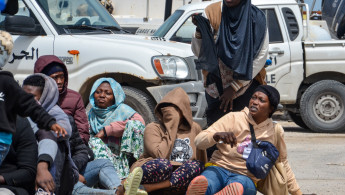Camps, assault and death: the horrors facing black migrants in Tunisia
"We are dying. We have no water, and our phones will soon die. Please help us."
That was one of the last messages The New Arab received before losing contact with the hundreds of migrants stranded at the militarised buffer areas between Tunisia, Libya and Algeria.
Since 3 July, Tunisian forces have reportedly arrested and deported over 800 migrants and asylum seekers, including children and pregnant women, to the Tunisian-Libyan militarised zone of Ben Guerdane. Other buses reportedly headed to the Algerian-Tunisian borders, dropping dozens of other migrants in the desert area.
Beneath a temperature of at least 40 degrees Celcius, men and women were forcibly kicked out of transport buses and dumped onto a scorching desert with broken phones and no food or water.
Human Rights Watch (HRW) said cases of sexual assault and death were registered during the arbitrary expulsions.
The bodies of at least two migrants have been found near the border between Tunisia and Algeria, according to AFP.
The Alarm Phone NGO has notified Tunisian authorities and the UN's affiliated refugees and migration bodies. However, it has received no response.
"The Tunisian Red Crescent cannot supply them; they have no access authorization to Libyan territory," according to the NGO.
🚨 « Water, water », « We are dying, aidez-nous ».
— Salsabil Chellali (@SaChellali) July 12, 2023
Message vidéo d’appel au secours reçu d’un groupe expulsé par les autorités tunisiennes, dont des enfants et femmes enceintes, près de la frontière libyenne. #Tunisie @hrw_fr pic.twitter.com/GRazNjxXls
HRW has urged Tunisian authorities to halt the collective deportation of migrants and asylum seekers and to enable the delivery of humanitarian assistance to those stranded in the desert.
Tunisian President has denied accusations that his country had infringed on the human rights of the migrants through its deportation policy, saying, "Tunisia can give lessons in humanity to all those placing their bids on it from abroad."
Facing the backlash, Tunisian authorities started Tuesday deporting migrants back from the desert to camps in Ben Guardan and Tetaouine.
Over 100 migrants were transferred to the institute of Ben Guardan, an educational establishment, where they will be housed temporarily.
However, on Wednesday, the Tunisian Educational Union decried the accommodation of Sub-Saharan Africans, urging their immediate expulsion from the institute.
"We strongly reject this action and hold the authorities fully responsible for any consequences that may result from it. We have decided to suspend our work at this institution until they are removed," reads the Union's statement.
Black migrants want out of Tunisia
The migrants' crisis broke out on 3 July after a Tunisian man was stabbed to death during racially motivated clashes with the Sub-Saharan migrants in the southern city of Sfax.
The death of the Tunisian man led to a massive arrest and deportation campaign against Sub-Sharan migrants as armed residents took to the streets urging their deportation.
Tensions in Tunisia between sub-Saharan African migrants and locals have been worsening since February, when Tunisian President Kais Saied made discriminatory remarks about Black Africans, accusing them of being responsible for Tunisia's ills and causing a crime wave.
"We better be deported back to our home countries. It's better than the conditions where we live now," Kylian, an Ivorian migrant, told TNA.
Kylian, 23, arrived in Tunisia last year hoping to secure a place on a migration boat heading to Europe. Though, his attempts have failed so far.
Nos journées sont passées sous un soleil brûlant de 40 degrés, dormant avec des enfants et des personnes blessées tandis que personne ne tient compte de notre réalité. Tout ce que nous demandons, c'est de l'aide, car nous sommes à bout de forces.#Tunisie #Sfax #arrestation pic.twitter.com/bejVYY8tay
— je suis migrant (@jesuismigrant) July 13, 2023
Today, he stays with dozens of other migrants, including children, women and injured, at a park in Sfax after being kicked out of their houses or fleeing willingly, fearing violent clashes with residents.
"We just want a safe getaway," he added. Though, he says he has little hope of making it alive. "They have approval from Europe to do whatever they want to us. No one can stop them," argued the migrant.
Several migrants and activists interpret the EU's silence on the migrants crisis in Tunisia as a "carte blanche" for Saied to continue with his anti-migration policy.
Tunis faces growing pressure from the EU to increase its border control measures and prevent hundreds of boats from attempting to cross to Europe daily, following recent back-to-back visits from European leaders.
The North African state is expected to sign another agreement with the EU with further migration-related terms in the upcoming days.





 Follow the Middle East's top stories in English at The New Arab on Google News
Follow the Middle East's top stories in English at The New Arab on Google News


